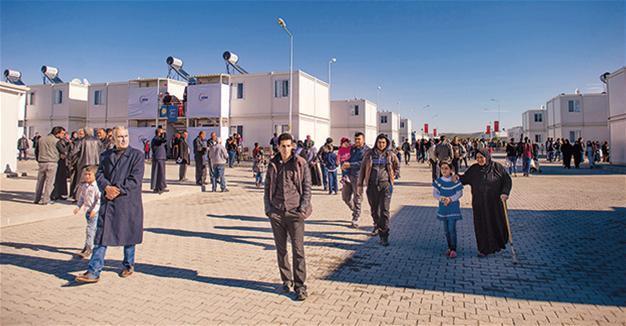Officials extend protest ban on refugee camp construction in Kahramanmaraş over security concerns
KAHRAMANMARAŞ

AA photo
The Kahramanmaraş Governor’s Office announced on Dec. 26 that it had extended a ban on protests over the construction of a container city for around 25,000 Syrian refugees near predominantly Alevi-populated villages for the ninth time, citing security concerns.
The governor’s office in the southern province said in a statement that there had been attempts to bring the issue to the agenda illegally since March, leading authorities to extend the ban until Jan. 27, 2017.
“Considering the intelligence, social media posts, regrettable events in our province in the past and the instruction of illegal actions by leaders of the terror organization, it has been evaluated that any kind of action could be provoked by marginal groups, events could be used as a propaganda tool by illegal organizations, illegal organization members could infiltrate demonstrating groups and they could stage attacks on security forces with stones, sticks, Molotov cocktails, hand-made explosives and arms and there could be attempts to create a conflict environment within society,” the governor’s office said in a statement.
“It has been deemed appropriate to ban activities of any kind of gathering, press statement, demonstrations, sit-ins, stands and tents to protest the temporary accommodation center in the Sivricehüyük neighborhood between Dec. 29 and Jan. 27, 2017,” it said.
The construction of the camp has drawn widespread resistance from locals, who are fearful of a rekindling of ethno-religious tensions with the potential arrival of extremists to a historically sensitive region that is home to 24 predominantly Alevi villages.
In May, three experts charged with assessing plans to build the container city also advised against the construction.
Through 1978 and 1980, in the run up to the Sept. 12, 1980 military coup d’état, Alevis were subjected to mass killings not only in Kahramanmaraş, then called Maraş, but also in Sivas and Çorum by ultranationalist groups.
An appeal by villagers for an “urgent stay of execution” for the container city plan was already filed at an administrative court, with locals citing fears that “Syrian jihadists” would be settled nearby.
